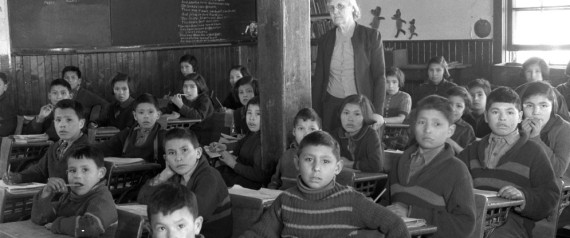
By Michael Bolen, The Huffington Post, Canada
A fresh campaign is underway to push the United Nations to label Canada’s treatment of First Nations people “genocide.”
On Monday, former National Chief Phil Fontaine, elder Fred Kelly, businessman Dr. Michael Dan and human rights activist Bernie Farber sent a letter to James Anaya, UN special rapporteur on the rights of indigenous peoples, arguing that several specific crimes against aboriginal people in Canada qualify as genocide under the post-Second World War Convention on the Prevention and Punishment of the Crime of Genocide (CPPCG)
Article 2 of the Convention states that “genocide means any of the following acts committed with intent to destroy, in whole or in part, a national, ethnical, racial or religious group, as such:
(a) Killing members of the group;
(b) Causing serious bodily or mental harm to members of the group;
(c) Deliberately inflicting on the group conditions of life calculated to bring about its physical destruction in whole or in part;
(d) Imposing measures intended to prevent births within the group;
(e) Forcibly transferring children of the group to another group.”
The letter writers assert that at least three actions on the part of Canadian governments constitute genocide under those rules.
1. Sir John A. MacDonald’s policy of deliberately starving First Nations people to make way for settlers in the Canadian west.
2. The residential school system and especially the decision of Department of Indian Affairs chief Duncan Campbell Scott not to address rampant tuberculosis among students.
3. The forcible removal of aboriginal children from their homes for the purpose of adoption by white families, a practice known as the “Sixties Scoop.” Estimates put the number of children removed between the 1960s and the mid 1980s at around 20,000.
Farber and Dan have previously argued that the recently revealed nutrition experiments performed on children at residential schools also qualify as genocide.
The genocide argument has been criticized by Sun News pundit Ezra Levant, who wrote this summer that “Canada does not and never has had a policy of exterminating Indians. Genocides don’t normally include billions of dollars a year in government grants to the group in question, affirmative action hiring quotas, land reserves and other privileges.”
Levant accuses Dan of hiring Faber to curry favour with First Nations people so his Gemini Power Corp. can get permission to build power plants on reserves.
Farber told HuffPost Canada in an email that Levant’s characterization is inaccurate.
“Ezra, as usual, gets it wrong.”
The letter from Farber and company was sent as special rapporteur Anaya concluded a visit to Canada. He said Canada faces a “crisis” regarding its indigenous people and called for an inquiry into missing and murdered aboriginal women.
The Conservative government pledged to renew efforts to address the issue of murdered and missing aboriginal women in its throne speech Wednesday.
Earlier this year, former prime minister Paul Martin referred to residential schools as “cultural genocide.” In 2012, Justice Murray Sinclair, the chairman of Canada’s Truth and Reconciliation Commission, said the removal of children from their homes to residential schools was an act of genocide, but that it didn’t necessarily qualify under the UN Convention.
There have only ever been two successful prosecutions under the Genocide Convention, former Rwandan prime minister Jean Kambanda and ex-mayor Jean-Paul Akayesu for crimes during the 1994 slaughter in that country. The UN’s highest court cleared the government of Serbia of genocide charges in 2007, but found it breached international law in failing to stop the killing and by not handing over officials accused of war crimes.
The push for action from the UN comes amid renewed violence between authorities and aboriginal peoples. On Thursday, police cars were torched during an attempt by the RCMP to enforce an injunction to end a demonstration against shale gas exploration in eastern New Brunswick. The Mounties said at least 40 people were arrested
The violence has sparked a renewal of the cross-country protests seen during the Idle No More movement last winter.
With files from The Canadian Press
